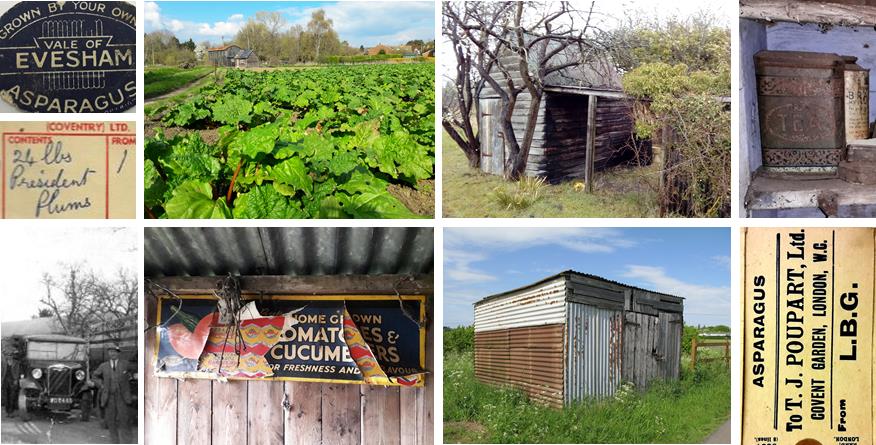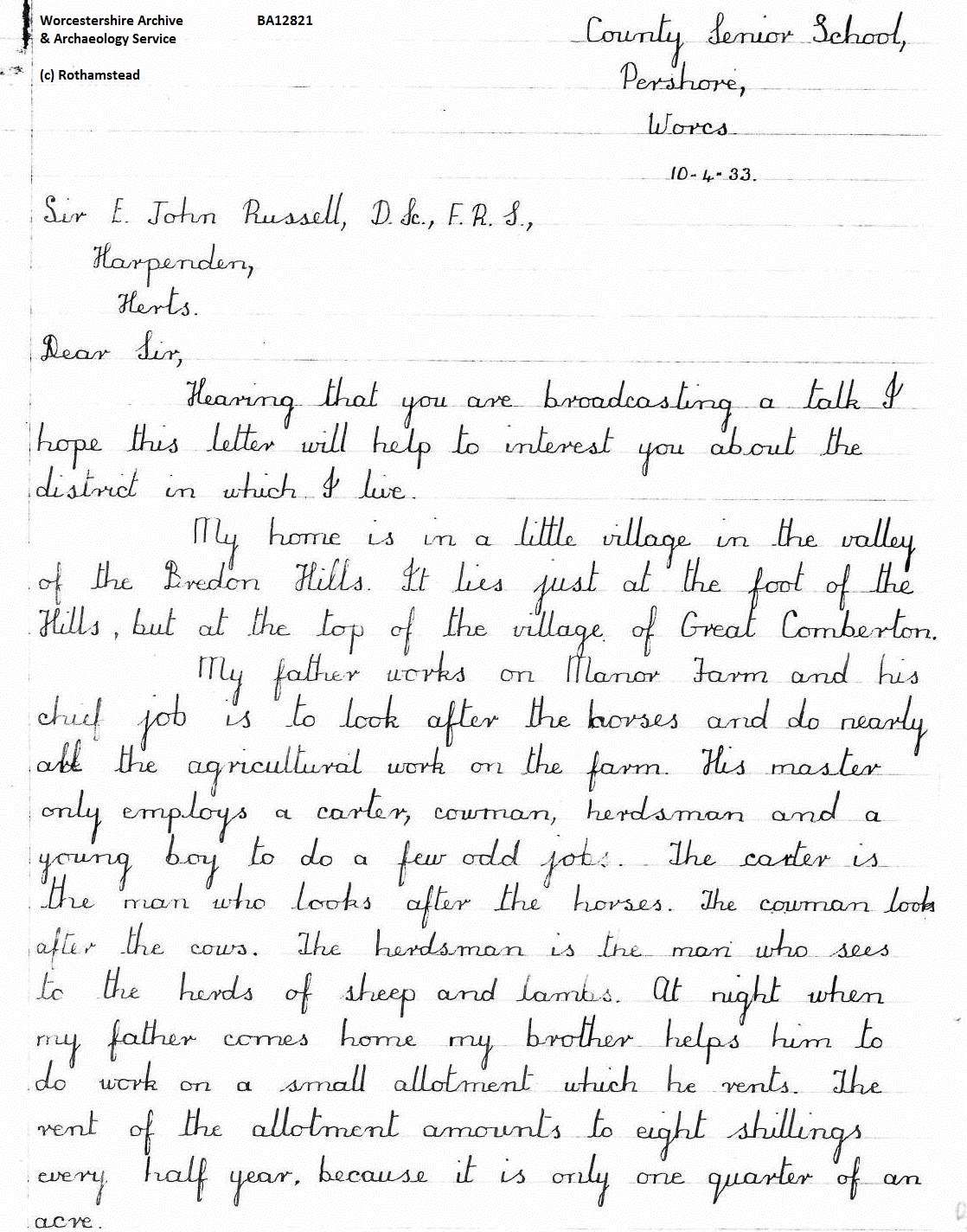Market Gardening Heritage Project – 1933 Letters by Schoolchildren
- 12th June 2019
As part of the Market Gardening Heritage project, we’re drawing information from various sources to uncover the lives and stories of market gardening, which was vital to the Vale of Evesham throughout much of the 19th and 20th centuries. Alongside recording local memories and investigating the buildings constructed by growers on their grounds (locally called ‘hovels’), we have a wonderful team of volunteers who are delving deep into the archives.

Many items that end up in archives deal with administrative history: minutes, accounts, reports and records that relate to the running of a business or organisation. However, some sources do give personal accounts of life and individual perspectives, which are fascinating for the interesting stories they often contain. One example, which is a treasure trove for this project, is a collection of letters written by school children in 1933 about market gardening in the Vale of Evesham.
In 1933, Sir John Russell of Rothamsted Experimental Station in Hertfordshire was preparing for a BBC talk series on agriculture, entitled ‘What the Counties Do’. Rothamsted was an agricultural research centre founded in the 1840s and still operates today. As part of his research, Russell contacted local schools to get the point of view of children in the featured counties.
For Worcestershire, two local schools – Badsey School and Pershore Senior School – were contacted and the children asked to send him letters outlining their experiences and views of market gardening. Sixty letters were sent back, providing details about what their families and neighbours did, how they helped outside of school and the nature of market gardening within the area.
The letters are kept in the library at Rothamsted, but a few years ago the librarian asked if we would like copies as they felt they would be of local interest, to which we said a very quick yes!

We do not know if Sir John ever gave his talks, but the letters are a fascinating insight into market gardening at the time through 60 pairs of eyes. The Badsey Society has digitised all the letters from their area, which you can read online, but the Pershore letters are currently only available in the county archives at The Hive.
Over the next few months, a volunteer will be going through the Pershore letters to see what they contain, so that we can tease out the stories and compare how market gardening and the lives of 1930s children differed across the Vale. Stories and information from the letters will shared along the way and used in the educational and reminiscence resources created at the end of the project.
To pique your interest, a quick look reveals the wealth of information waiting to be discovered:
- Sprout picking contest – Sprouts were a key crop, providing work over the quieter winter months. People got so fast at picking sprouts that Pershore apparently had a speed picking competition! On a chillier note, one boy describes how the sprouts they pick are sometimes frozen.
- Variety of produce – One letter includes a plan of how the ground they helped with was planted in April and September. Many letters talk about the crops their families or neighbours grow, listing a whole range of fruit, vegetables, herbs and flowers. One boy described how his dad rotated crops, cabbages in one plot one year, then cabbages, then leeks, and leaving some parts fallow for a year, telling us about how they manage the plot and the soil. Many talk about fruit trees on the plots, apple and plum trees with produce grown in between. Flowers were an important crop, with half a plot devoted to them in some cases.
- Four meals a day – Some letters describe a typical day in the school holidays, which mostly started at 6.30 or 7am. Interestingly, several accounts show that they had breakfast before leaving the house, lunch around 9.30am, dinner at noon and tea back at home around 6pm. Given how much hard physical work market gardening was, it’s no surprise that four meals a day were needed. Fruit picking and tying onions are two of the most common tasks the children talk about helping with, and one girl even had their own piece of land for vegetables and flowers.
- A family enterprise – The importance of women and children comes across strongly, as the main grower in the family (usually the father) relied on their help to get everything done. It’s striking that family members who didn’t directly help with market gardening usually worked in a related industry, such as the canning factories around Evesham and Pershore.
- Growers had varying amounts of land – The amount of land a family rented differed considerably, with some market gardeners large enough to employ other people, whilst others had a piece of land that was too small to provide enough income, so they worked for someone else from spring to autumn and tended their own land in evenings and at weekends.
Once we’ve been through the letters in more detail, we’ll write an update to share the pictures these 60 letters gives of market gardening in the Vale through the eyes of children.
If you have any information, stories or photos related to market gardening that you’re happy to share, please do get in touch as we’d love to hear from you! Call into one of our drop in events or use the contact details below. If you’re interested in carrying out research for the project, let us know as we’ll be running another training workshop in the autumn.
Many thanks to Rothamsted Research for kindly giving the Market Gardening Heritage project permission to use the letters, which remain the copyright of Rothamsted Research.
Market Gardening memories – drop in events
Evesham Town Hall, Sat 6th July, 11-2
Pershore Town Hall, Sat 10th Aug, 11-2
Drop in to find out more about the industry that shaped the Vale’s landscape and history throughout the 19th and 20th centuries, or bring along photographs and memories to help share, celebrate and preserve this important local heritage.
Get in touch: explorethepast@worcestershire.gov.uk | 01905 766352

We are grateful to National Lottery Heritage Fund for support
There was a programme broadcast on 10-10-1965
on BBC about market gardening in the Vale of Evesham. I have been trying to locate it as My Grandparents were featured in it Arthur Keen and Family.In fact his son wrote one of the letters featured on the Badsey website.as most of the Family have now passed I would dearly love a copy if you can locate it as it would be of interest for your project
Thanks for letting us know about this programme! It would be really interesting to see, although old BBC footage can be tricky to locate unfortunately. The national film archive, held by the BFI, only contains BBC One programmes since 1990 and any prior to this date are held by the BBC, so it’s possible that there is no surviving copy. I’ll speak to our archivists and get back to you.